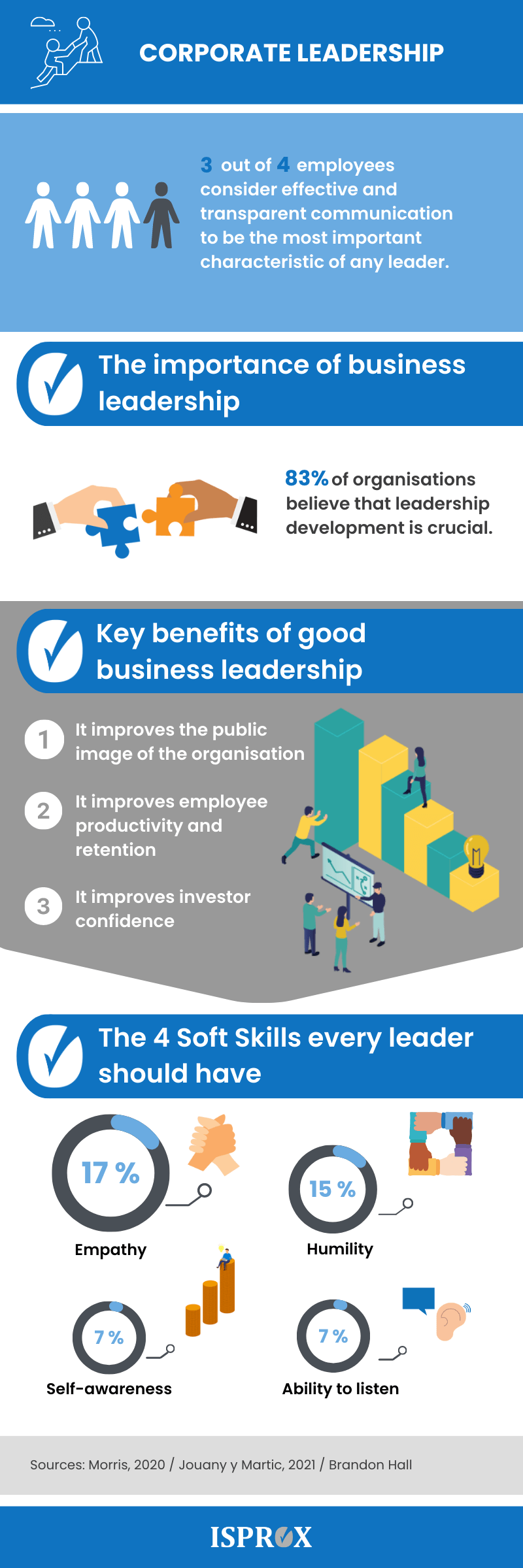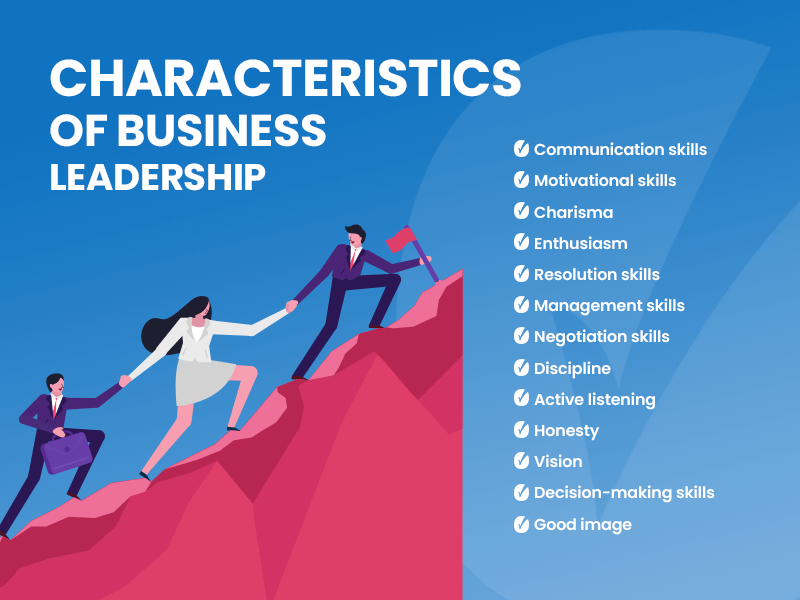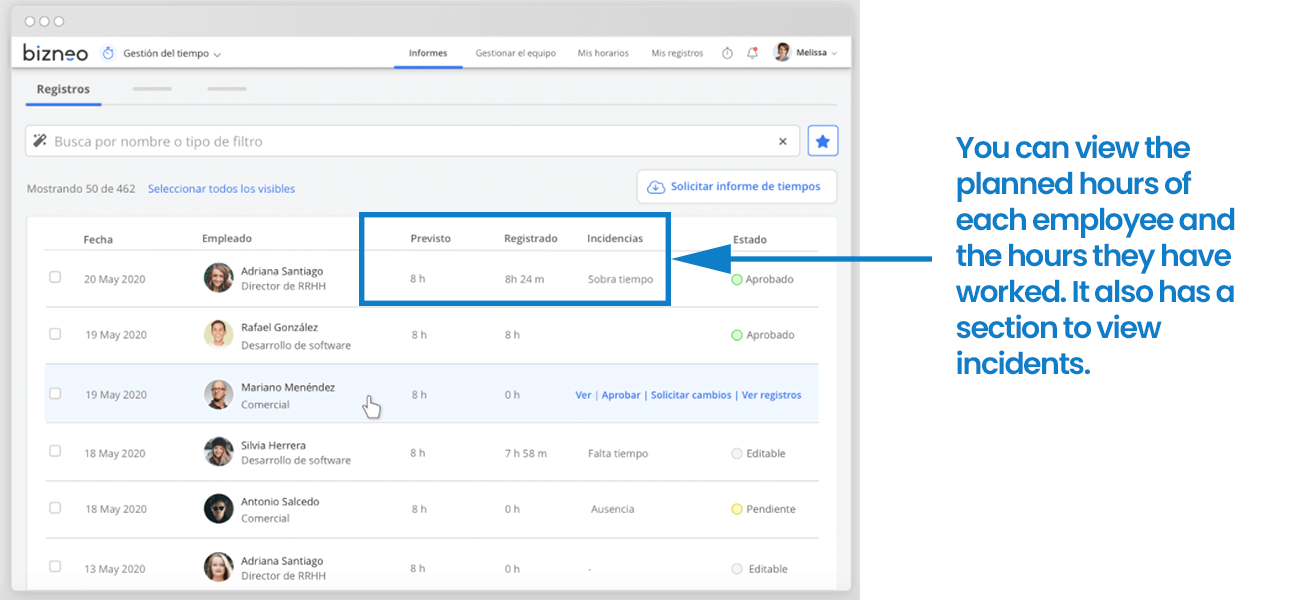Big companies are no longer looking for bosses. In their search for new talent, leaders are the biggest attraction, and several studies have shown that productivity increases when there is good business leadership, in other words, it's a process the company uses to influence others in order to achieve its objectives.
In this article we will talk in depth about the importance of leadership and what defines a good leader from a practical point of view, because we are convinced that a leader is born but also made.
Index of contents

Content
Before jumping right in, we need to be clear about the basis of the concept, and for this we will refer to the definition of the renowned Brazilian psychologist and writer Idalberto Chiavenato, who specialises in the area of Business Administration and Human Resources:
“[Leadership] ] Is a process in which the Leader exercises the ability to influence and lead a group of people, motivating them to work with enthusiasm towards the fulfilment of the organisation's objectives".
However, according to John Maxwell, American lecturer and writer, business leadership can also be defined on the basis of other criteria:
"Good leaders are those who get the work groups and teams they lead to perform at a superior level".
Leadership can be defined from many points of view, but we could say that it is a set of managerial skills that an individual possesses within a company to intervene in the way of being or behaviour of a work group, making it act with enthusiasm towards the achievement of its goals, thus improving the company's production.
A good leader is capable of leading the company towards achieving its objectives and, among them, improving productivity. According to a survey by the Institute for Corporate Productivity, 76% of companies associate good leadership with increased productivity.
In addition, according to several studies, 30-40% of a company's business results depend on the working environment, and of this percentage, more than 70% is determined by the management style in the company.
Today's leadership has shifted from the typical hierarchy where employees must serve their managers to a reverse role, where managers serve their employees, leading and guiding them effectively.
In the business world, corporate responsibility is usually understood as the fulfilment of objectives aimed at maximising profits for stakeholders and shareholders, but there is another, deeper vision and that is where servant leadership comes into play.
This type of leadership holds us accountable for our own behaviour towards employees, thus creating a happier, more productive and better performing team.
Therefore, having good leaders in an organisation guarantees maximum production effectiveness.
What are the qualities that a good leader should have? Although it is true that not all companies find the same characteristics in a leader, there are some common traits:

A good leader must communicate effectively with their team, expressing what they need, what they want to achieve, as well as conveying instructions and their motivations for making certain decisions.
"The art of communication is the language of leadership. If you want to be a leader, you must be a presenter who connects with the audience and delivers a memorable message".
James Humes, American presidential speechwriter.
There is no leadership without motivation; the motivated and motivating leader is essential in a company.
This ability to motivate will help create the perfect working environment for increased productivity, where workers will be more motivated and happy, decreasing tension and absenteeism in the workplace.
If you want to increase your employees' motivation, we recommend you involve your employees in the company's goals, for example, by communicating all the objectives set and, once they have been achieved, reporting the results to them. In this way, their work will become meaningful and their desire to achieve future goals will increase.
Also, beyond the salary, another fundamental part of an employee's motivation is that they feel they contribute value to the company and that their efforts are recognised.
A charismatic leader is a person who knows how to convince, who has magnetism, who knows how to lead employees with a smile so that they get the job done easily.
Some tips to increase charisma and influence over others are:
"Our interlocutor engages up to 40% more with our message if when we move our hand we keep our palm up or facing them, compared to palm down."
Who doesn't like to work with positive and pleasant colleagues? Remember that enthusiasm is contagious. The leader must be able to convey security and confidence to employees, and this ability allows them to create a pleasant working environment.
"The work environment affects almost 20% of the company's productivity."
Roberto Luna, Professor and Professor of Business Management at the Universitat de València.
Some tips to improve workplace atmosphere:
You should create a pleasant atmosphere with whiteboards (as an example) where workers can share ideas and comments, inspirational pictures, as well as brand awareness through various elements.
Allow employees to set their best hours to work, according to their productivity, to achieve a better work-life balance.
If you want to implement flexible hours in your company, you can use a platform or software to quantify the hours worked by each employee, such as Bizneo which allows you to see the hours worked, overtime, time spent doing each task, among other things.

Getting close to employees and gaining their trust is one of the main ways to encourage a good working environment.

A good leader thanks the team and recognises their merits. Employees with greater trust are 50% more productive and 76% more committed, according to a study by PwC.
One of the most important characteristics of a good leader is the ability to resolve conflicts, i.e. to be able to immediately solve problems that hinder the development of teamwork.
Having a good capacity for planning and coordinating resources, whether human, material or time, is essential.
A leader must be able to persuade others, create beneficial relationships with collaborators, clients and suppliers. In order to achieve the desired objective in a negotiation, a command of various proven negotiation techniques is crucial.
This is a very important element in leadership development. The leader is someone who dares to be creative and push for change in search of new directions to transform and improve a situation. To develop creativity, you must be able to leave behind the fear of failure or the judgement of others in order to avoid blockages, give yourself time to think and be willing to write down all your ideas.
In order to achieve the objectives set, a leader must convey the requirement not only to their co-workers but also to themselves, earning the trust of their team through their actions. The leader should not ask something from their workers that they do not provide; they should lead by example.
A good leader must listen to the workers by focusing all their attention on what they are saying. The aim of active listening is to fully understand the message, including feelings, i.e. to listen beyond words, paying special attention to non-verbal communication.
To improve your active listening, we recommend paraphrasing, for example, by summarising what has been said to you in your own words, thus demonstrating interest and verifying that you have understood it correctly.
Another tip is to ask questions to your employees when they are explaining something to you. This will give you more information, as well as the context or specific details of the subject matter and your concerns.
The leader of a company should always speak the truth. A good leader is an honest, transparent person, especially when it comes to leading others. In order to get the job done, the leader must be clear about the objectives set.
80% of employees want their boss to share more information with them about what their company is doing, according to a study by Geckboard. In fact, according to the same report, 25% of respondents know someone who has left their job because of a lack of information.
Transparency allows employees to know the direction their company is taking and to better define their scope of action. The information they receive, be it results, strategies or any other company-related topic, will allow them to perform their tasks better, but also to understand the whole project and why the actions are carried out.
Juan Ferrer, consultant, trainer and coach, believes that employees who know all the information and projects of the company can be key to improving it.
"Experience has shown me that if employees are asked and involved in the change, they are the ones who lead it."

To become a good leader, one must have a long-term vision, think about the future, be able to detect opportunities and anticipate possible threats.
To do this, a leader must have a deep knowledge of the company, its strategies and objectives, its environment, the trends and evolution of its sector, and have an attitude of continuous training, reading books and seeking expert advice when necessary.
A good leader must be able to make decisions effectively and judiciously, without arbitrariness.
When making decisions, you need to know the problem or situation you are facing, where you are and where you want to get to.
It is important to remember that there is not always only one right option. As a leader you have to be objective in order to evaluate all the possible options, so that you can realise that there are more alternatives than you thought at first glance.
Once you have found the different options, we recommend that you analyse the pros and cons of each one. The more decisions you have made, the more experience you will have, and the more you can use it to improve.
You can write down similar decisions you have made in the past and analyse their results in order to use this experience for future decisions. It is necessary to clarify that this method can lead the leader to put on the brakes based on bad experiences. This is not the idea, we mean that you should compare situations and learn from them.
A leader's leadership ability and good reputation have multiple advantages for the company. Executives attribute 45% of their company's reputation and 44% of their company's market value to the reputation of their CEO, according to a Weber Shanswick survey.
Leaders teach their team members through their words and actions and encourage workers to put aside selfish behaviours in favour of serving others.
Leaders must listen to employees and ask for their participation, ideas and feedback. Over time, they will get to know the worldview of each of their employees, and adapt their leadership approach accordingly.
No one is perfect and we all make mistakes, even the best leaders. With this in mind, leaders push for high standards of work, quality of service and alignment of values across the team, holding themselves accountable and empowering their employees to work in a more responsible and critical way.
This is about helping and guiding employees to learn vital skills that will enhance their performance and development.
It is essential to realise that one or two conversations sometimes do not bring about the change you are looking for in an employee's mindset.
Leadership involves being consistent and investing as much time as necessary to educate and inspire servant leadership practices in team members.
As you can see, leadership is a must in the business world. A company without a good leader who can motivate their team will not be able to grow and, of course, if it does grow, it will do so much more slowly.
Bear in mind that a worker who is happy in their working environment will achieve their objectives sooner, which increases profits and improves the company's image, both internally and externally. It also makes the company more competitive.
"A company with happier employees has a 37% increase in sales and a 31% increase in productivity".
Shawn Anchor, researcher at Harvard University.
Applying servant leadership will contribute to the development of your team, allowing you to achieve excellence and professional success much faster.
Are you looking for talent to expand your team?
At ISPROX, we help you find the right profile, saving you time and increasing your success rate in hiring.






Essential for basic site functionality and security. Always active.
Guardan tus ajustes como idioma o región.
Help us understand how you use the site (e.g., Google Analytics).
Allow personalized advertising and measure effectiveness (e.g., Meta/Ads).